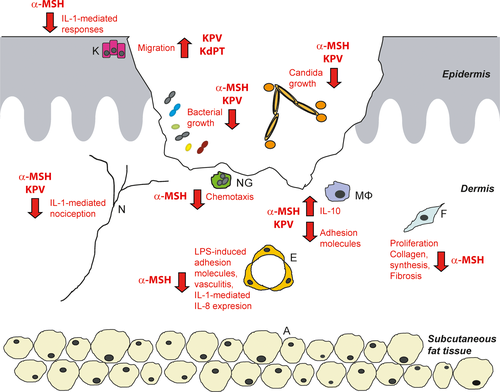KPV Tripeptide

Also Known As
Lysine Proline Valine | Tripeptide | a-MSH Fragment
What is KPV?
KPV is an oral peptide derived from alpha MSH (Melanocyte Stimulating Hormone) that acts potently on immune-mediated inflammatory conditions such as dermatitis, bowel diseases, allergic asthma, and arthritis by inactivating pro-inflammatory pathways.
It is found naturally in the body as a breakdown product of aMSH.
Actions:
- Improves Gut Health
- Mast Cell Stabilisation / Reduces histamine
- Assists post toxic-mould exposure
- Anti Inflammatory
- Anti Microbial
- Wound Healing
- Skin Healing
- Protect against Nerve Damage
- Strengthen Immune System

Detailed mechanisms:
In a mice model of colitis (colon inflammation), oral administration of KPV (added to drinking water) inhibited the activation of NF-κB and MAP kinase inflammatory signalling pathways and reduced pro-inflammatory cytokine secretion.
- Dalmasso G, Charrier-Hisamuddin L, Nguyen HT, Yan Y, Sitaraman S, Merlin D. PepT1-mediated tripeptide KPV uptake reduces intestinal inflammation. Gastroenterology. 2008;134(1):166–178. doi:10.1053/j.gastro.2007.10.026
KPV exerts its anti-inflammatory activities through inhibition of NF-kappaB translocation and activation of MC(1) receptor/cAMP.
- Mandrika I, Muceniece R, Wikberg JE. Effects of melanocortin peptides on lipopolysaccharide/interferon-gamma-induced NF-kappaB DNA binding and nitric oxide production in macrophage-like RAW 264.7 cells: evidence for dual mechanisms of action. BiochemPharmacol. 2001;61(5):613-21.
- Haddad JJ, Lauterbach R, Saadé NE, Safieh-garabedian B, Land SC. Alpha-melanocyte-related tripeptide, Lys-d-Pro-Val, ameliorates endotoxin-induced nuclear factor kappaB translocation and activation: evidence for involvement of an interleukin-1beta193-195 receptor antagonism in the alveolar epithelium. Biochem J. 2001;355(Pt 1):29-38.
In an animal model of colitis, KPV significantly reduced intestinal inflammation.
- Rajora N, Boccoli G, Catania A, et al. α-MSH modulates experimental inflammatory bowel disease. Peptides. 1997;18:381–385.
- Oktar BK, Ercan F, Ye en BC, et al. The effect of α-melanocyte stimulating hormone on colonic inflammation in the rat. Peptides. 2000;21:1271–1277.
KPV fights inflammation by inhibiting tumuor necrosis factor-α stimulated NF-κB activity and suppressing antigen-induced lymphocyte proliferation.
- Kelly JM, Moir AJ, Carlson K, et al. Immobilized α-melanocyte stimulating hormone 10–13 (GKPV) inhibits tumor necrosis factor-α stimulated NF-κB activity. Peptide. 2006;27:431–437.
-Cooper A, Robinson SJ, Pickard C, et al. α-melanocyte-stimulating hormone suppresses antigen-induced lymphocyte proliferation in humans independently of melanocortin 1 receptor gene status. J Immunol. 2005;175:4806–4813.
KPV suppresses inflammation through modulation of physiological responses in host defence.
-Hiltz ME, Lipton JM. Antiinflammatory activity of a COOH-terminal fragment of the neuropeptide alpha-MSH. FASEB J. 1989;3(11):2282-4.
KPV exhibits its anti-inflammatory effect through inhibition of IL-1beta functions.
-Getting SJ, Schioth HB, Perretti M. Dissection of the anti-inflammatory effect of the core and C-terminal (KPV) alpha-melanocyte-stimulating hormone peptides. J PharmacolExpTher. 2003;306(2):631-7.
KPV fights inflammation by stimulating cAMP generation in a concentration- dependent way.
-Schiöth HB, Muceniece R, Mutule I, Wikberg JE. New melanocortin 1 receptor binding motif based on the C-terminal sequence of alpha-melanocyte-stimulating hormone. Basic ClinPharmacolToxicol. 2006;99(4):287-93.
KPV combats inflammation by significantly inhibiting NF-kappaB activity.
- Kelly JM, Moir AJ, Carlson K, Yang Y, Macneil S, Haycock JW. Immobilized alpha-melanocyte stimulating hormone 10-13 (GKPV) inhibits tumor necrosis factor-alpha stimulated NF-kappaB activity. Peptides. 2006;27(2):431-7.
Several studies have shown a significant reduction of pro‐inflammatory substances such as IL1 β, IL6, TNFα, IL8, Groα, and interferon γ (IFNγ) following KPV treatment.
-Luger T A, Scholzen T, Grabbe S. The role of α‐melanocyte stimulating hormone in cutaneous biology. J Invest DermatolSympProc 1997287–93.
- Brzoska T, Luger TA, Maaser C, Abels C, Böhm M. Alpha-melanocyte-stimulating hormone and related tripeptides: biochemistry, antiinflammatory and protective effects in vitro and in vivo, and future perspectives for the treatment of immune-mediated inflammatory diseases. Endocr Rev. 2008;29(5):581-602.
In murine models of colitis, KPV treatment showed significant anti-inflammatory effects which suggests that it can be an important therapeutic option in treating inflammatory bowel disease.
- Klaus Kannengiesser, MD, et al. Melanocortin-derived tripeptide KPV has anti-inflammatory potential in murine models of inflammatory bowel disease, Inflammatory Bowel Diseases, Volume 14, Issue 3, 1 March 2008, Pages 324–331, https://doi.org/10.1002/ibd.20334.
In a mice model of ulcerative colitis, oral administration of KPV loaded into hyaluronic acid (HA)-functionalized polymeric nanoparticles (NPs) was effective in alleviating intestinal inflammation.
- Xiao B, Xu Z, Viennois E, Zhang Y, Zhang Z, Zhang M, Han MK, Kang Y, Merlin D. Orally Targeted Delivery of Tripeptide KPV via Hyaluronic Acid-Functionalized Nanoparticles Efficiently Alleviates Ulcerative Colitis. Mol Ther. 2017 Jul 5;25(7):1628-1640. doi: 10.1016/j.ymthe.2016.11.020. Epub 2017 Jan 28. PMID: 28143741; PMCID: PMC5498804.
